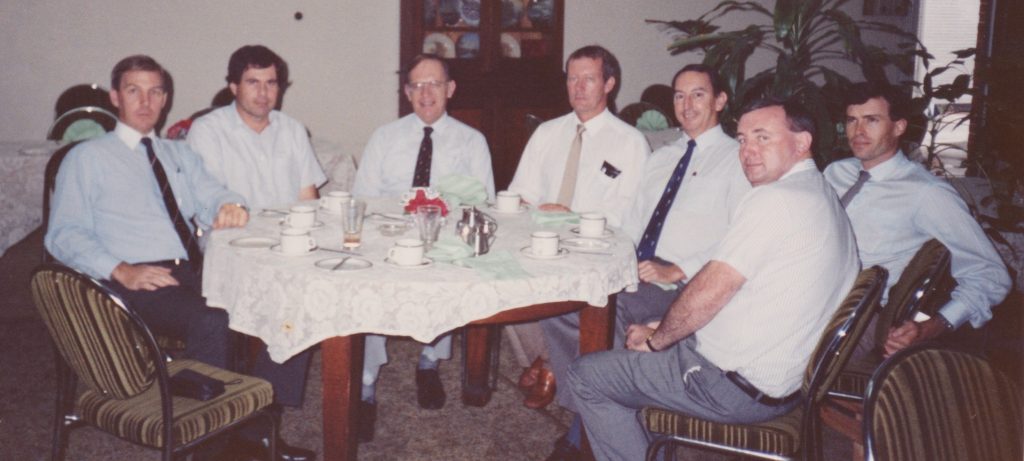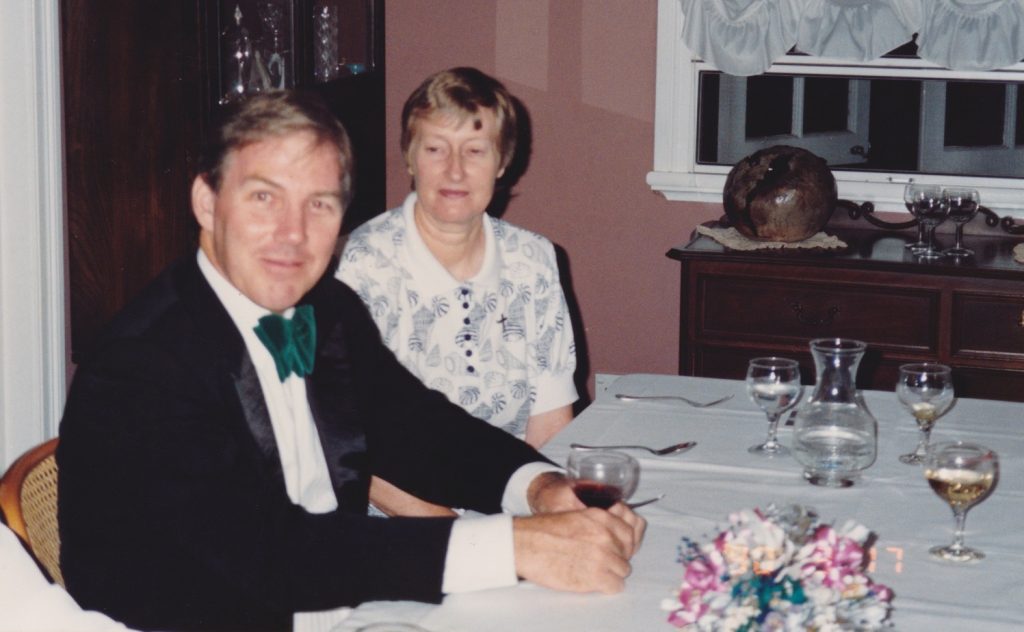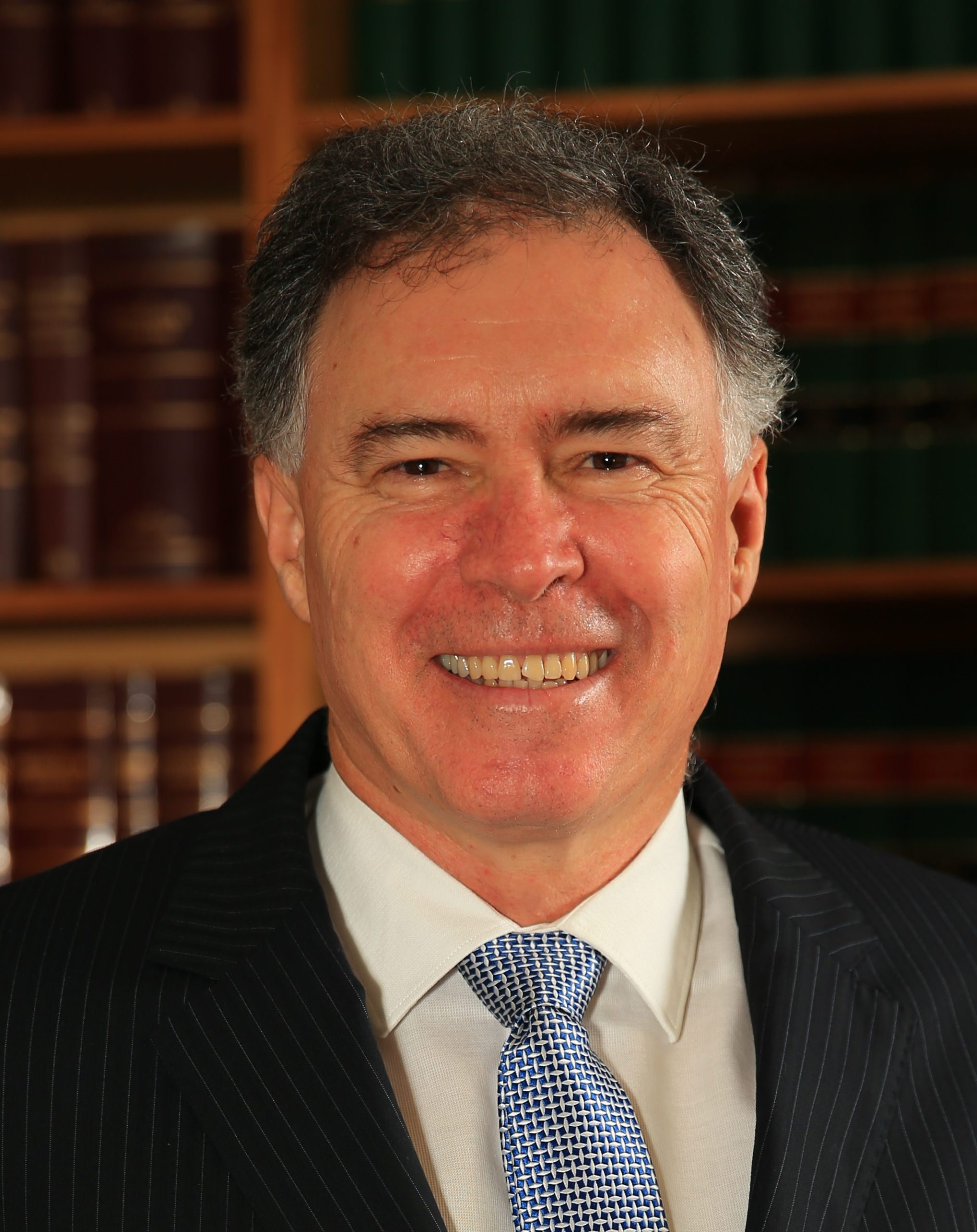Grant Britton KC passed away on 19 November 2024, aged 78 years, after a short and unexpected illness.
Few of the Bar would know much about him. He was a quiet man and spent much of his life far from Brisbane. He spent most of his career based in Rockhampton – a barrister practising there for nearly 20 years and then the resident District Court judge for 14 years. But he was an accidental lawyer. I do not mean one prone to mistakes – quite the contrary – but one who, when young, never envisaged the life he came to lead.
He graduated from Banyo High School on the north side of Brisbane, and in response to an advertisement for an articled clerk he applied. He had no idea what an articled clerk was, or whether it was any different from a clerk employed anywhere else, indeed he expected a position with something like a junior at Woolworths. Hence, he started with no knowledge or expectation of being a lawyer, but he ended up with Don McDonald, solicitor of Brisbane, and entered into articles for ultimate admission as a solicitor.
Grant felt proud of the fact that he was, he believed, the first graduate from his high school to ever become a lawyer, a mistaken career as it was. Many decades later he was invited to a celebration of the 50th anniversary of his alma mater. Rightfully so, as he was the first lawyer from their ranks. Unfortunately, at the gala dinner, it became apparent that the organisers had intended to invite a prominent footballer of the same name and not Judge Britton SC. Such is fame.
After his servitude with Don McDonald – a colourful tutor who was struck off the roll eventually – and admission as a solicitor in 1969, Grant took up partnership with Gilshenan and Luton, then and now a legal firm noted for its expertise in the criminal law. Bill Weir recalled they were admitted to partnership together in 1973, with Grant in charge of civil litigation and more the cerebral lawyer, better suited, Bill thought, to a barrister’s practice. The barristers retained by the firm and who Grant watched in action included the best of their time and who would grace a court perhaps at any time: Peter Connolly, Bill Pincus, Des Sturgess, and Bill Cuthbert. Some training for the barrister he would become!
Times were very different then. Grant once told of briefing Bill Pincus – later a Federal Court judge and one of the inaugural judges of the Queensland Court of Appeal – who then was a relatively young practitioner. Grant was then about 19 or 20 years old. A doctor was to give evidence in Grant’s client’s case and arrived at counsel’s chambers for a pre-trial conference, albeit dressed in his “tropical” outfit of shorts, long socks, short sleeve shirt. Pincus could not believe his eyes. In Grant’s presence, Bill rang the presiding judge – the stern Chief Justice Mansfield – and said words to the effect (deleting expletives) that this fool of a medical witness has come so dressed and inquired whether the Chief Justice would hear him? A strong “no” was the response from the Chief, and the doctor – suitably chastised by Pincus – was sent hurriedly off to the local haberdashery.
Good luck today getting a medical practitioner to a courtroom let alone to your chambers, and the last doctor I saw had been apparently guided in their attire by an episode of “Scrubs”! And judges today would not so much as blink at – indeed would gratefully welcome – a neatly attired witness.
Another anecdote from those days but of more noble content: A solicitor – who Grant barely knew – handling the other side of a personal injury case rang him at home one Sunday. The practitioner said that he had been going through his files and said merely that Grant might look closely at his own file. He did. Grant, to his horror, saw that he had not issued the Writ, as we then did to commence proceedings and stop time running under the statute. The limitation period expired the next day, so Grant’s virtually unknown colleague saved him from the certainty of a professional negligence suit. The profession was smaller then and Grant’s gratitude to the kindness was fondly remembered decades later.
In February 1977, nine years after admission as a solicitor, Grant was admitted to the Bar. By then he had an honours degree in law. He joined More Chambers, then in Ansett House in Turbot Street (now the Hotel Indigo). He enjoyed a convivial group there with the work an emphasis more on the criminal side. His chamber mates included Don Muller, Mac Boulton, Des Breen, and Kerry and John Copley, and they remained on good terms in the years ahead.
The Central Queensland chapter of Grant’s career started in 1979. While he enjoyed what was a good start to practice in the city, he had a growing family, an alarming number of newly admitted barristers competing for briefs, and an opening – he was told – in Rockhampton. His great friend Bruce Forbes, a solicitor in Gladstone, told him of untold numbers of briefs available and too few barristers. He moved, and the rest is history.
Grant took over the chambers of Dan Ryan, who headed off to the solicitor ranks, and so joined me in chambers upstairs to a bank, in three rooms that cost us the princely rent of $26 per month, each including parking, an amount Grant never remembered to pay. The landlord, the manager of the CBC Bank, was hardly concerned; he apologised for charging any rent, given the contest between the cockroaches and the rats in the rooms.
In 1977 when I joined the Bar in Rockhampton there were three others – Bob Hall, Stan Jones and Dan Ryan. In 1979 Keith Dodds and Peter White joined us at the private bar but practising from three different chambers. In 1982 Grant and I joined Stan Jones and Bob Hall, and together purchased 170 Quay St, chambers that barristers had used since the 1930s. Hence, six of us, from that point, shared a “home”. Each of us was destined to become a judge: Hall (in 1983), Keith Dodds (in 1986), White (in 1992), Jones SC (in 1997), Britton SC (in 1998), and me (in 2007). Indeed, it is worth noting that Keith Dodds, as Central Crown Prosecutor, was replaced by Marshall Irwin, later Chief Magistrate and District Court judge, and then by Kerry O’Brien, later Chief Judge of the District Court.

Circa 1989 – Grant Britton, Anthony Mellick. Demack J, Dodds DCJ, Jones QC, Brian Harrison, Duncan McMeekin
In consequence – from 1979 in particular – we were opposed every day by practitioners of uniformly considerable experience and talent. While making our professional lives more demanding, it served to improve our professional skills immeasurably.
Grant enjoyed immediate success with much of his work coming from Gladstone and Emerald practitioners. Indeed, Dan Ryan had left some 50 briefs on his floor from John Crossan, solicitor of Emerald, as a welcome gift. And he enjoyed career long support from the prominent Rockhampton solicitors, especially John Shaw of Swanwick Murray Roche and Tom Carmichael of South & Geldard. Grant’s success in his early years before the local Magistrates was truly remarkable. I would jibe him that he plainly thought like a Magistrate as often their reasoning – which he clearly followed – was often obscure to many of us. However he managed to do so, and he rarely lost. As a result, he developed a strong following among the solicitors. This stood him well as the more complex cases came along.
But there was not unalloyed success. One day he strolled into chambers looking relaxed. “What’s on” I asked. “A walk in the park” he responded. “Before the Planning Court with a litigant in person. Back in half an hour”. He was right about that much. He came back looking pretty dejected. “Yes, a litigant in person,” he said, “But he beat me on a point of law”.
Grant enjoyed a varied practice but as the years passed, he concentrated on the civil side and usually in the Supreme Court. His work was marked by a thorough and careful approach. He was not given to overstating his case. His manner was invariably calm and his approach to witnesses courteous. He was of the school who believed that honey would be more successful than vinegar. We were both opposed and often before the great Justice Demack.
So often were we opposed that I could with some confidence anticipate his expected cross-examination on any given topic. And no doubt he thought of mine. On a celebration on his appointment as a District Court judge – in my toast to him – I commented that in our near 20 years in chambers together and opposed in court we had not had a serious argument. A poor choice of words; Justice Demack – with his quiet humour – observed, as to the latter, that he could confirm that indeed we had not.

Grant Britton and Dorothy Demack
Generally, when discussing the goings on among the chamber mates, a mention is made of their collective effort to secure their futures by identifying profitable investments. In this we were spectacularly unsuccessful. Pride precludes me identifying the worst but some are prime candidates.
The suburban Rockhampton home purchase which we made and then rented seemed innocuous at the time, but our subsequent identification in the 1988 Fitzgerald Commission on Corruption as owners of the leading brothel in Rockhampton conducted by our tenant – who never missed his rent, and over the road from the Anglican’s Bishop’s home – was disconcerting. Especially so for Grant as he enjoyed the role as Chancellor of the local Anglican Diocese.
A close run in the disastrous investment stakes was the block of flats that we – being Stan Jones, Grant and me – failed, much to our chagrin, to even so much as visit before purchasing them. The units turned out to be over the way from the city rubbish tip, the “way” being the rail tracks over which came frequently the one kilometre long coal trains, and next to the busiest pub in the city. Worse still, we could not agree among us who should have the task of evicting the tenants who had used the lounge carpet as the ideal place to carry out repairs on their motorbikes. Their membership of the “Rebels” did cause us pause to volunteer.
Perhaps these investment debacles founded some impetus for each of us to secure a judicial pension as a means of surviving in our retirement.
Grant was granted silk in November 1998 and a week later was appointed a judge of District Court in Rockhampton, upon Judge Nase moving to Beenleigh. While he held commissions as a judge of the Planning and Environment Court and the Children’s Court, Grant’s 14 years on the bench consisted principally of the conduct of criminal trials and sentences. While his background at the Bar was on the civil side, he took well to the criminal work.
Unfortunately, with age, Grant was afflicted with significant hearing loss. He insisted on having the trial transcript, including submissions, before him in preparing his summing up. This, perhaps, ensured that he was rarely overturned on appeal. Counsel knew him to be careful and invariably courteous. There are two types of judges – those who ask and intervene and those who don’t. Grant rarely spoke and had a reputation of some asperity. This was far from true. I often met him as he quit the court chuckling at the goings on during a trial.
Grant had the usual course of young lawyers as associate, but he eventually settled on his old friend Gordon Roberts as his associate for the last years on the Bench. Gordon had been Registrar of the Supreme Court in Rockhampton for the previous 20 years and by now in his seventies. Gordon’s penchant to drift off in the afternoon proceedings, combined with his and the judge’s profound deafness, resulted in some hilarity in the courtroom as the judge would endeavour to attract the associate back to the business of the court. “What did he say?” he asked to Gordon of the counsel’s question. “What did you say Judge?” “No, what did he say.” “No, I didn’t hear what you said Judge.” “No, what did counsel say”. Eventually the bemused counsel would shout out their last question.
I have glossed over his family life. He and Denise, his first wife, enjoyed an active social life, often entertaining at their home, which we often enjoyed. They had five children together, a son Tony and four daughters, Geraldine, Angela, Rebecca and Melissa. One, who perhaps should not be identified, but who was not a daughter, at the age of three, managed to burn their home down after finding a box of matches. But none were hurt. He greatly loved them and thoroughly enjoyed a large family. Their marriage faltered and they eventually parted. Grant and Christine then married, thereby gaining two more children, Mike and Kate, of Christine’s first marriage, and they spent some 25 years together.
Grant’s first love was carpentry and, through his life, enjoyed and was skilled at his woodworking hobbies. He retired to a small farm in Maleny to enjoy his hobbies, and where it was joked – so steep was his block – his cows often fell to the creek far below. He and Chris only recently moved to Toowoomba to be closer to family and start a new life. Sadly, he was not to enjoy it.




 Circa 1989 – Grant Britton, Anthony Mellick. Demack J, Dodds DCJ, Jones QC, Brian Harrison, Duncan McMeekin
Circa 1989 – Grant Britton, Anthony Mellick. Demack J, Dodds DCJ, Jones QC, Brian Harrison, Duncan McMeekin
 Grant Britton and Dorothy Demack
Grant Britton and Dorothy Demack